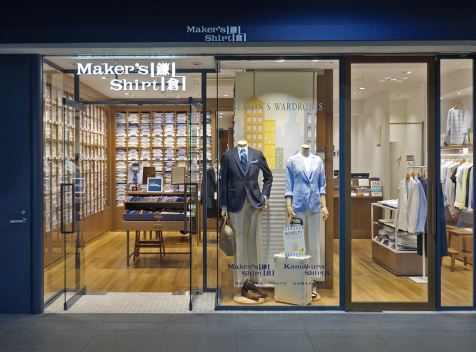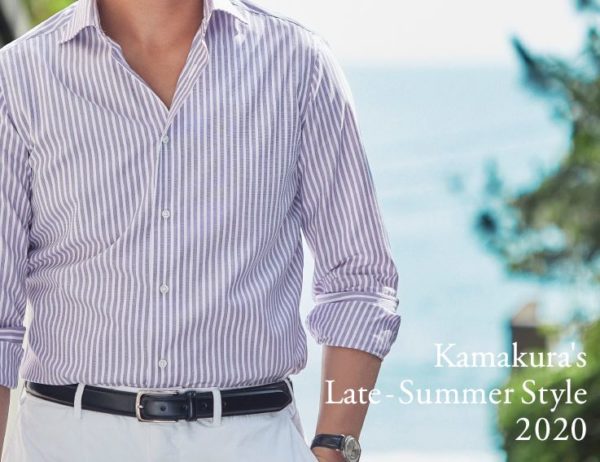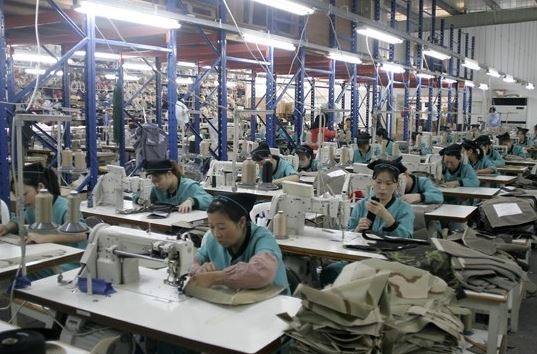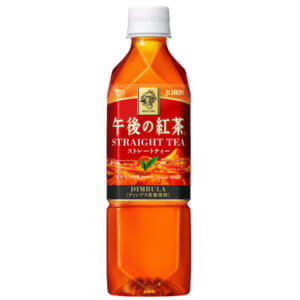Made in Japan means "high quality"
CONTENTS
What does "Made in Japan" mean?
Since its start as a men's shirt shop in 1993, Maker's Shirts KAMAKURA (Kamakura, Kanagawa Prefecture) with a policy of "offering surprisingly quality shirts at 4,900 yen" has continued to make garments that are particularly about being "made in Japan." The business that started out in a small office above a convenience store is today selling 600,000 shirts a year with about 3 billion yen in sales.

The opportunity that especially broadened Maker's Shirts recognition factor was the "Lehman shock" US financial meltdown of 2008. Since then many apparel businesses scurried to cut prices and offer discounts, but we did not cut prices at all. In fact, our company has never had one discount sale in 18 years. This in fact seems to have led to the way our customers support us.
When you put on one of our shirts for the first time, you will be convinced of its comfortable feel. That we can give our customers its comfort at such a reasonable price means our customers keep bringing us more new customers. Building up our business through this idea has kept year on year growth at 100% in men's shirts, and we did achieve 168% growth year on year in overall sales as well in 2010.
Reasons why we insist on “made in Japan”
There are two reasons that we insist on "made in Japan." One is our desire to do something to aid the Japanese textile industry which is on the brink of a final decline.
Our country's textile industry is a major industry which engages about 2 million people. Yet while the world apparel industry grows by 2%-3% each year, sales for the Japanese textile industry are going down by about 10% annually. The industry is unable to keep up with changes in the times.
During the period of high economic growth in Japan, there was a time when the department store was the largest player in retail. Department stores carried top of the line goods, had a broad product lineup, and customer draw was outstanding. The department store business model under which mass produced merchandise was purchased and pooled in mass quantities, then released for sale in smaller lots, gave rise to huge profits.
However, today the merchandise handled by department stores is the same merchandise to be found in discount retailers and small boutiques. Further, Japan is now a fully matured society where consumers will only buy items that are really good or really necessary. As a result, mass quantities of goods are left unsold in stores, and eventually returned to the distributor. When that happens the distributor tries to cut production costs by moving production to cheap labor countries like China, while on the other hand normalizing use of repeated discount sales and sacrifice sales at outlet malls in order to more quickly monetize merchandise.
Watching this situation develop, we cannot help but feel acutely aware that Japan's apparel industry has lost the "way of selling," or business ethics. Is it really acceptable to lower prices without thinking twice, justifying it by saying you were unable to sell to the customer at the promised price? If you were to take the position of the customer who actually bought the product before you lower the price, you would realize that it is the equivalent of betraying the customer, and something that should never be done.
Customers look at merchandise very carefully, always trying to determine if it's genuine. We need to do business in a manner that will make the customer think, "This company will never betray me" and "This is not a trick."
As for myself, who decided a long time ago to make my living in the textile industry, I have always believed in doing business in a way that will gain the customer's trust. When I was at VAN, negotiating with department stores and discount retailers would sometimes involve unreasonable transactions, being blamed for poor qualities and forced to take back merchandise. Also at that time the power of the American mass clothing discount retailers had become considerable, so thinking that perhaps America was now the embodiment of the "way of selling" or business ethics, I did travel to America in 1991. What I noticed there was that the merchandise consumption rate was below 51%, and the industry was rampant with huge discounts and outlet malls. I sensed deeply that unless building a completely new business model, there was no way for this industry to rebuild itself.
How to Respond to the Customer's Needs and Wishes?
So, how are we to respond to and meet the customer's wishes?
The conclusion I finally arrived at was the business model currently in use by our company, which is kojo-chokketsu, or direct link to factory. This means to directly link production and sales, without going through intermediate distributors.
The traditional business model in the Japanese apparel industry had been to sell cheap goods at high prices. Due to the fact that the high commission paid to the intermediate distributors, the expenses of returned goods and reshipping were added on, the merchandise that is produced at a low price would end up being offered at a very high price.

On the other hand, the cost percentage of the shirts our company offers is as high as 60%. The fabric is 100% cotton, the buttons are made of natural trocas shell, and shirts are fabricated to high technical standards. But because we do not have to go through intermediate sellers, we are able to offer the product at a price that adds just a small profit to our base cost, so that our price is in line with the discounted price of other makers.
Also, because, under this business model, production is directly linked to the sales section, we can finely tune production to respond to market trends. Besides we make only as many items as are needed, so that it is difficult for there to be a loss on any one style.
"Sell a high cost product cheaply" – "Make only as many as will sell, of items that are selling." These are my ideals, and I definitely feel a favorable response to this business model.
New Factory in Japan Gives Dreams to Youth
The other reason that we are particular about "made in Japan" is that we can better maintain high product quality, and because we want to broadcast the great quality of Japanese brands to the world. The shop we opened at Haneda Airport International Terminal last October is also a foothold into international development.
Fashion from the beginning is an emotional purchase rather than a functional purchase. Items with a high emotional aspect cannot be created without the care and presence of the person making it. To go further, precisely because the thoughts and care of the maker are present in the garment, the seller is moved to take more care in selling the item, and that is conveyed to the customer. When he or she senses that message, he or she thinks for the first time, “I want that garment.”
That is why we esteem the trust relationship we have with our factories, our makers, and why we have always, since the company was founded, settled open accounts with them in cash by the following month. We never have monetary dealings delayed by the process of billing or putting a trading company in between. This helps build trust, so that when we tell our factories we want to make something a certain way, they understand and respond to our enthusiasm, sewing stitch by stitch with heart and soul.
But most apparel businesses have moved production overseas. This makes it impossible to share thoughts and feelings with the makers of the garments. It may be possible to make standardized items in mass production overseas, but in order to have something made that is imbued with the touch of the maker, it really has to be "made in Japan" to be acceptable.
To go further, from the beginning Japan's sewing technology has been incomparably more advanced than China's. Previously I visited a factory in China that was said to be the most technically advanced in the country. I hesitate to say it but the sewing speed was like watching something in slow motion. Conversely, when I invited the manager of that factory to a Japanese sewing fabricator, he was astonished by the speed and accuracy of their operations.

The reason for this difference lies in the employee retention ratio. In China, I understand that most employees leave within three years, while in Japan, once a person has a job they tend to stay with it for life. This allows for a high degree of technical skill to develop and for those skills to be passed on.
The mastering of a single skill is the "advantage" of Japan's monodukuri manufacturing tradition (knowledge-based or highly skilled manufacturing). We can't afford not to take advantage of this. Today 95% of textile manufactured goods are made in China, but if Chinese labor costs were within one-third, Japan would be able to compete easily. Labor costs in China are escalating rapidly, and within three years are expected to be very close to Japan's minimum wage, so there is little reason to continue manufacturing in China.
Within men's apparel, button-down shirts are the most important item. At present Chinese made shirts are around even in better stores, but KAMAKURA Shirts has the potential to displace those Chinese made garments. The wall of tariffs is a drawback at this time to competing overseas, but if the Trans Pacific Partnership (TPP) comes to be in the near future, I believe that we will be able to expand our overseas business in one fell swoop.
In preparation for that, we plan to be making "made in Japan" garments of 1 million annually for Japan and 4 million annually for overseas markets three years from now. These are not numbers we pulled out of a hat, but numbers that we arrived at based purely on customer demand.
We are facing some challenges in meeting this goal however, of which the most urgent is the building of an adequate production system. There are nine factories in Japan with whom we do business currently, and the situation today is that they do not have the capacity to make garments for export, with capacity of only 850,000 garments today. The average age of factory workers is also advancing.
That is why we are planning to finance jointly with the nine factories that make a new company set up sometime this year. This is partly with the objective of expanding our production capacity, but also has the significance of ensuring the continuance of Japan's sewing technology and expanding employment.
To Tackle the Issue of Labor Shortage

From time to time I have the opportunity to visit dressmaking schools and to talk with the staff there. Apparently even when they are able to turn out students with a high level of dressmaking skill, they are reluctant to take jobs in factories in the rural areas. It is small wonder that, when looking at the current state of Japanese made garments which are forced into the minority by the huge number of overseas produced goods, they are unable to discover their dreams of working in a sewing fabricator in Japan. For that reason, apparently there are many youngsters who give up, even though they really want to work in sewing, and end up taking jobs in other industries, or working in apparel sales trying to at least stay connected to the industry.
For the sake of these young people too, I think it is imperative to create sewing factories where they can work and keep hold of their dreams. Not a factory that cannot stay afloat unless they pay minimum wage, but a facility that makes it possible to sustain high productivity and efficiency, while turning out high quality goods.
At this new factory, we intend to make it possible for our current manufacturing partners who are now in competition with each other to share technology and keep open information exchange with each other. We may call this "all-Japan monodukuri manufacturing." The textile industry which went down without a fight in the face of the "western invasion" may in return raise a giant hinomaru Japanese rising sun banner, and advance across international seas. Thinking along these lines makes me believe that the day when "made in Japan" will be the victor in the global textile industry.
In the world market, "made in Japan" does not mean simply that the item was manufactured in Japan. It is a synonym for high product quality. We will continue to make goods that we can be proud of, never being the subject of derision. Our dream is of the day that there are men and women wearing KAMAKURA shirts walking the streets of the world, in England, America and China.


